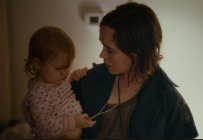Netflix original film “Tallulah” follows the story of Tallulah (Ellen Page), a young girl without a home or family who finds herself adopting motherhood when she kidnaps the baby of a drunken, unstable mother.
The story focuses on the epidemic that is children growing up in broken homes. Tallulah herself was abandoned on the street by her mother as a six-year-old, only to be found and kidnapped by a stranger.
When confronted with the opportunity to, in her eyes, save an infant from an unhealthy household, Tallulah was unable to ignore it. She could not deny the child her care after noticing that the child’s environment was unfit for a healthy childhood because Tallulah herself still suffers from the tragedies of her own childhood.
Tallulah felt as though she was burdened with her past, which is an idea touched on multiple times throughout the film. She would often imagine herself in a world in which gravity did not apply to her, in a world in which she was not weighed down by her past.
Tallulah, however, comes to the conclusion that, even if given the opportunity to “fly away,” she would still grab onto something like a tree branch to keep herself attached to the earth. In other words, Tallulah did not want to die or abandon her life, she just did not want to continue to suffer the repercussions of her past.
Tallulah kidnapped a child, but she did it for what she believed to be good reasons. She truly believed that taking the child with her was the right thing to do. The viewers cannot immediately dismiss Tallulah as an evil antagonist despite her having committed a serious crime because she truly had caring intentions.
However, her actions still raise a debate as to whether she had the right to decide that the baby’s household was unfit for her to be raised in. From what Tallulah saw, the child’s mother Carolyn (Tammy Blanchard) could only financially support her daughter. She had no interest in her daughter and even showed hatred towards her; Carolyn admitted that she often blamed her daughter for burdening her life and stopping her from pursuing the lust and luxuries life has to offer.
Tallulah arrived at Carolyn’s hotel room looking for scraps of food. Carolyn opened the door, assumed Tallulah worked for housekeeping, then insisted that she watch her daughter while she, a married woman, went on a date. Tallulah, despite having told Carolyn numerous times that she had no experience with babies, was bribed into babysitting.
Carolyn came back that night horribly drunk. Because of this and how Carolyn had been acting earlier, seemingly dismissive of her daughter and careless, Tallulah decided that Carolyn was in no condition to care for her daughter or to be a mother at all.
It seemed as though Carolyn was regretful of having her daughter and disgusted with the idea of motherhood entirely. Tallulah, although having no right to the discretion over a child’s life, also believed that no child should belong to a parent who does not want a child, and she acted on this moral.
“Tallulah” was a great film that touched on many difficult topics regarding family life. No family is perfect. However, what is important, far more so than maintaining a “perfect” family, is making sure that each family member is loved and cared for. The lack of attachment is what will ultimately hurt the most in the end.


